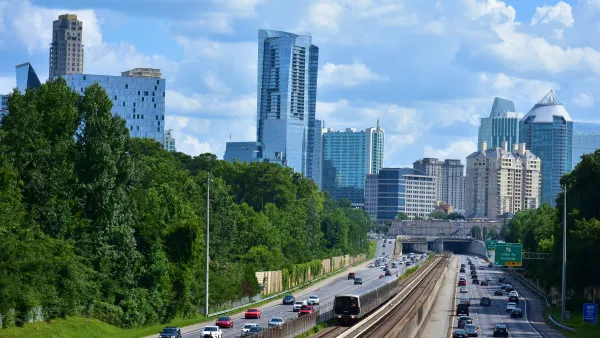In Massachusetts, transportation funding is one of the key issues to be addressed by the state legislature this year. James Aloisi, former Transportation Secretary, offers an inventive way to fund Transit Improvement Districts.
The primary source of transportation funding in Massachusetts is a 19-cent gas tax that has been unchanged since 1993. Governor Patrick Deval Patrick attempted to increase that tax in 2009, but the legislature opted to use increased sales tax revenue to fund transit and roads when those attempts failed.
The current funding is insufficient to address the state's transportation needs, and to make up the gap, Aloisi has proposed what he calls a "carbon impact parking assessment." The assessment is envisioned as a tax on nonresidential parking lots and garages with more than 20 spaces that are located within the district of the Massachusetts Bay Transportation Authority. Revenue from the parking tax would be directed towards improving the public transportation system and bike and pedestrian pathways.
"Parking taxes are not unusual in major cities," says Ryan Holeywell, "but at times, they have been politically unpopular." Such plans have resulted in political strife, such as when the University of Scranton sued its namesake city over a new parking tax and when Chicago residents objected to the $2-per-day "congestion fee" implemented by Mayor Rahm Emanuel.
"Aloisi says the plan would mitigate the environmental impact of automobiles while providing funding for other modes of transportation and ensuring that funding remains locally controlled."
FULL STORY: Should Parking Be Taxed to Fund Bike Paths?

National Parks Layoffs Will Cause Communities to Lose Billions
Thousands of essential park workers were laid off this week, just before the busy spring break season.

Retro-silient?: America’s First “Eco-burb,” The Woodlands Turns 50
A master-planned community north of Houston offers lessons on green infrastructure and resilient design, but falls short of its founder’s lofty affordability and walkability goals.

Delivering for America Plan Will Downgrade Mail Service in at Least 49.5 Percent of Zip Codes
Republican and Democrat lawmakers criticize the plan for its disproportionate negative impact on rural communities.

Test News Post 1
This is a summary

Test News Headline 46
Test for the image on the front page.

Balancing Bombs and Butterflies: How the National Guard Protects a Rare Species
The National Guard at Fort Indiantown Gap uses GIS technology and land management strategies to balance military training with conservation efforts, ensuring the survival of the rare eastern regal fritillary butterfly.
Urban Design for Planners 1: Software Tools
This six-course series explores essential urban design concepts using open source software and equips planners with the tools they need to participate fully in the urban design process.
Planning for Universal Design
Learn the tools for implementing Universal Design in planning regulations.
EMC Planning Group, Inc.
Planetizen
Planetizen
Mpact (formerly Rail~Volution)
Great Falls Development Authority, Inc.
HUDs Office of Policy Development and Research
NYU Wagner Graduate School of Public Service





























